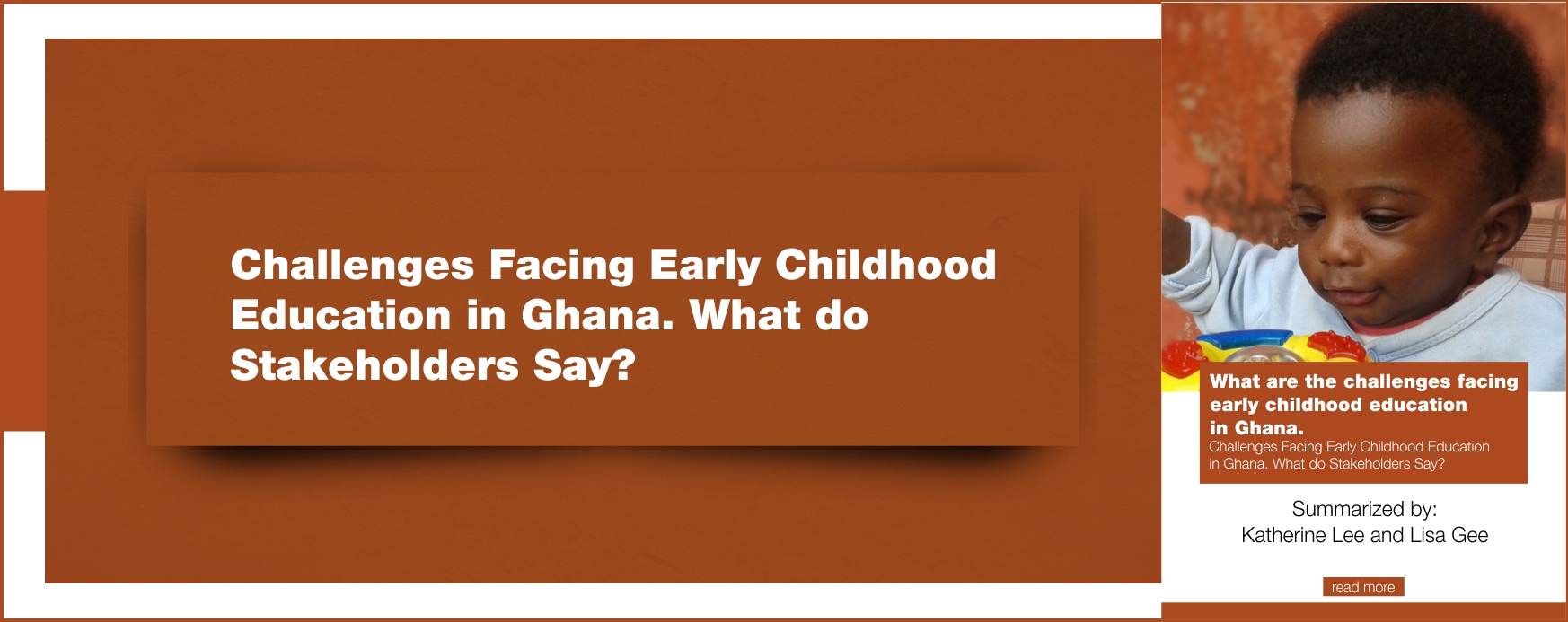Summarized by: Katherine Lee and Lisa Gee
What is the context for this research?
In 2003, Ghana adopted an Education Strategic Plan that included an early childhood education (ECE) policy which aimed at improving the skills and competencies of children. Since then, ECE programs in Ghana have remained a top priority for children's social, physical and mental development. While the benefits of ECE in national development have been well documented, more attention is needed regarding the challenges that affect their successful implementation. This study aimed to gather information from stakeholders about the challenges that affect early childhood education in Ghana
How was the research conducted?
The study was conducted in the Winneba municipality of the central region of Ghana. Seventeen participants consisting of the National Coordinator of Early Childhood Education, heads/proprietress in early childhood education, teachers/early childhood educators and parents were included in the study. The study used one-on-one interviews and focus groups to collect feedback on challenges in early childhood education. The questions were aimed at gathering information on what challenges exist, what factors contribute to these challenges, and recommendations to address these challenges.
What were the main findings?
The study identified public prejudice about the relevance of ECE to the total educational development of the child as a challenge. These prejudices were based on the persistent societal stereotypes about the essence, relevance, status and levels of intelligence of teachers involved in ECE. Below is a quote from one of the early childhood educators interviewed in the study.
“They don’t see why people should be trained with degrees to handle children in kindergartens. They believe we go there to sing songs and recite rhymes. For most people, early childhood educators can only sing and clap. People wonder why we should be wasting our time at that level when in actual fact we could be making productive use of our time at the higher basic levels”
Also, inadequate parental involvement and commitment to ECE were identified as challenges mainly by early childhood educators and heads of early childhood institutions. Furthermore, the limited number of teaching staff and teacher quality as well as the limited or no infrastructure and learning materials were also identified as major challenges. Below is a quote from one of the parents interviewed in the study.
“I think on the issue of class size it is a problem. Looking at where my baby is, when I go there I don’t feel comfortable because the school has one big classroom with three levels of pupils in the same classroom. When you enter the class there is total confusion because whiles one section is reciting a poem, another group is singing or counting numbers. I once asked the teacher in the school that do the children get or understand what she is teaching and she said yes. Even though I didn’t want to argue with her I knew the children could not pay attention because of the noise”
In addition to these, poor management and ineffective supervision of early childhood education programs and a lack of government support for early childhood education programs were identified as challenges.
The researchers found that these challenges were as a result of the inadequate understanding of early childhood education. The whole concept of ECE in terms of what it entails, its practices, and its relevance to the total education and development of children was still not well understood by the Ghanaian populace.
What were the study's conclusions or recommendations?
The overall recommendation was the need for a robust educational and sensitization program for the public about the important role of ECE in the child's educational development.
Other notable recommendations were that more effort should be made to encourage parental participation and partnership in ECE programs; individuals managing this area in district, regional, and national offices should have a background of studies and experience in ECE; and the government should show more commitment and support for early childhood education programs in addition to ensuring larger and more timely funding for these programs.
The study suggested that future work in this area encourage and foster collaboration between local institutions such as the community and early childhood centers in the use of local resources.
Source:
Abdulai, Ahmed. "Challenges Facing Early Childhood Education In Ghana. What Do Stakeholders Say?” Advances in Social Sciences Research 1.3 (2014)


